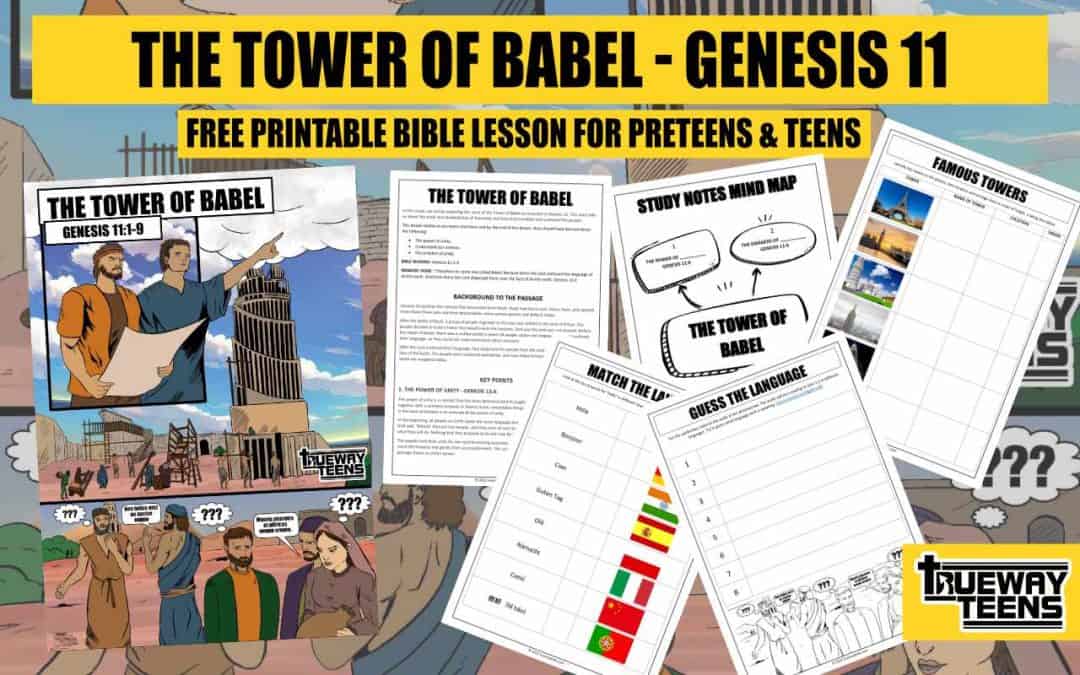In this study, we will be exploring the story of the Tower of Babel as recorded in Genesis 11. This story tells us about the pride and disobedience of humanity and how God humbled and scattered the people.
This lesson relates to pre-teens and teens and by the end of this lesson, they should have learned about the following:
- The power of Unity.
- Understand our motives.
- The problem of pride.
BIBLE READING: Genesis 11:1-9
MEMORY VERSE: “Therefore its name was called Babel, because there the Lord confused the language of all the earth. And from there the Lord dispersed them over the face of all the earth. Genesis 11:9
DOWNLOAD THE FREE PRINTABLE LESSON

BIBLE STUDY NOTES FOR TEENS
BACKGROUND TO THE PASSAGE
Genesis 10 outlines the nations that descended from Noah. Noah had three sons: Shem, Ham, and Japheth. From these three sons and their descendants came various groups and distinct tribes.
After the death of Noah, a group of people migrated to the east and settled in the land of Shinar. The people decided to build a tower that would reach the heavens. God saw this and was not pleased. Before the Tower of Babel, there was a unified world in which all people spoke one language, but God confused their language, so they could not understand each other anymore.
After the Lord confused their language, God dispersed the people from the land of Shinar over the entire face of the Earth. The people were scattered worldwide, and new tribes formed, eventually leading to the world we recognize today.
KEY POINTS
1. THE POWER OF UNITY – GENESIS 11:6
The power of unity is a concept that has been demonstrated throughout history. When people come together with a common purpose or shared vision, remarkable things can be achieved. The Tower of Babel in the book of Genesis is an example of the power of unity.
In the beginning, all people on Earth spoke the same language and had a unified culture. In Genesis 11:6, God said, “Behold, they are one people, and they have all one language, and this is only the beginning of what they will do. Nothing that they propose to do will now be impossible for them.”
The people used their unity for non-God honouring purposes. They sought to build a tower that would reach the heavens and glorify their accomplishment. The Lord saw this and was not pleased; however, this passage shows us unity’s power.
The Bible speaks clearly of the importance of working together in unity. Ecclesiastes 4:12 says, “Though one may be overpowered, two can defend themselves. A cord of three strands is not quickly broken.” This verse emphasizes the strength of partners working together as a unified force.
The New Testament speaks more clearly about the importance of unity in Christ. Romans 12:5 states, “so we, though many, are one body in Christ, and individually members one of another.” This verse speaks to how our unity in Christ binds us as believers. We all have a part to play in God’s kingdom that can only be achieved when we work together in unity and according to God’s purposes and will.
2. THE DANGERS OF MOTIVES – GENESIS 11:4
It is vitally important to understand the motivation behind our goals and actions. Our motivations can have a massive impact on our success and the success of those around us. If we are motivated by greed, pride or a desire for recognition, these can lead to negative consequences, as we see in the story of the Tower of Babel.
We should pause and ask ourselves why we are doing something or want something. It can help us to discern our motives for why we want something. If our reasons are pure and come from a place of love or service, then that is a good thing. However, if we are motivated by greed, envy or a need for recognition, those are not good motivations and can lead to negative consequences.
It is essential to ensure that our motives align with God’s will. When we seek to honour Him and glorify His name, He will bless our efforts and use them for His greater good.
This was not the case when the people of Babylon built the Tower of Babel. Even though the people were unified in their effort, their motives were rooted in pride and recognition.
Proverbs 16:2 says, “All the ways of a man are pure in his own eyes, but the LORD weighs the spirit.” This verse teaches us a valuable lesson about the importance of examining our words and actions to ensure we are following God’s will.
It is essential to recognize that even seemingly “good” deeds may not always be pleasing to God if they come from a place of selfishness or pride.
3. THE CONSEQUENCES OF PRIDE – GENESIS 11:3-7
The Tower of Babel teaches us about the consequences of pride. The people came together with a common purpose or vision to glorify themselves rather than God.
The Bible speaks a lot about pride and warns us to be careful of letting it consume us. Proverbs 16:18 states, “Pride goes before destruction, and a haughty spirit before a fall.” This speaks to the danger of letting our pride become too big for our own good and how that can lead to our downfall. In James 4:6, we are warned that “God opposes the proud but gives grace to the humble.”
Pride is a sense of superiority and an excessive amount of self-importance. Pride shows itself in many ways. For example, when we think our opinions and ideas are more important than anyone else’s. God doesn’t like our pride because it is a sin that goes against His nature and His desires for us.
We must guard our hearts against an attitude of superiority that seeks self-glory instead of giving glory to God. Pride is a sin of the heart, which we all need to be aware of and work to combat in our lives.
4. THE IMPORTANCE OF COMMUNICATION – GENESIS 11:8-9
The Tower of Babel shows the importance of communication. When all the people on Earth spoke the same language, they had a unified culture and could achieve anything they proposed.
Communication is important because it allows us to share our thoughts and feelings with others. It helps us to build relationships and connect with other people. When we communicate effectively, we can understand one another better and resolve issues more efficiently.
Many people have unique challenges when it comes to communication. With the rise of digital technology and social media, many daily are inundated with an overwhelming amount of superficial information and messages. They need help figuring out how to communicate effectively in online and in-person conversations.
So many people today feel unable to talk to those around them, including their parents. This can be so disheartening and have severe consequences in their day-to-day lives.
Worst of all, many people feel unable to communicate with God. They may feel like they’re too insignificant or undeserving of His attention or that He doesn’t really care about them.
The Psalms provide a wonderful example of what it looks like to communicate with God from a personal and intimate place. Throughout the Psalms, we see a variety of different types of communication: cries for help, expressions of thankfulness and gratitude, praises, requests for justice, questions about faith and life, and petitions for forgiveness and healing.
The Tower of Babel powerfully reminds us that open and regular communication is essential for our earthly and heavenly relationships.
CONCLUSION
Genesis 11 demonstrates the importance of understanding our motives. Pride is a sin that goes against God’s nature and His desires for us, so we must always be aware of its dangers and strive to combat it in our lives. The Tower of Babel reminds us that we cannot build relationships or understand one another without open communication. We must make sure to be humble and communicate openly with those around us, as well as with God. When we do these things, we can come closer to God’s plan for our lives and live out His will in all we do.
YOUTH GAMES AND ACTIVITIES FOR THE TOWER OF BABEL
Tower Building
- You will need a bag of marshmallows and some uncooked spaghetti noodles for each player or team.
- Divide the players into teams
- Explain to the players that they will have a certain amount of time (e.g. 5 minutes) to build the tallest tower they can using only the marshmallows and spaghetti. Remind them that the tower must be able to stand on its own, and that they are not allowed to use any other materials or tools.
- When you say “go,” the teams can begin building their towers. Encourage them to work together and come up with a plan for their tower.
- When the timer goes off, have the teams stop building and measure their towers. The team with the tallest tower wins!
Charades
- Divide the players into teams.
- Players will take turns acting out words or phrases without speaking, while the other players try to guess what they are trying to convey. The acting team will have a certain amount of time (e.g., 1 minute) to get their teammates to guess as many words or phrases as possible.
- Write down a list of 10-15 words or phrases on slips of paper. The words or phrases can be related to a specific theme (e.g., Bible passage, movies, animals, sports) or can be chosen randomly.
- The team who can guess the most words in the allotted time wins.
Don’t say it
- You will need a timer and a set of cards with word or phrase on one side and a list of forbidden words.
- The player must try describing the word or phrase on the card to their teammates without using the forbidden words.
- The player that explains the most about of words in one-minute wins.
- Example: Word or phrase: Tower of Babel Forbidden words: Tower, Babel, Build, God, Confuse, Language
Free printable Teen Worksheets in the lesson pack
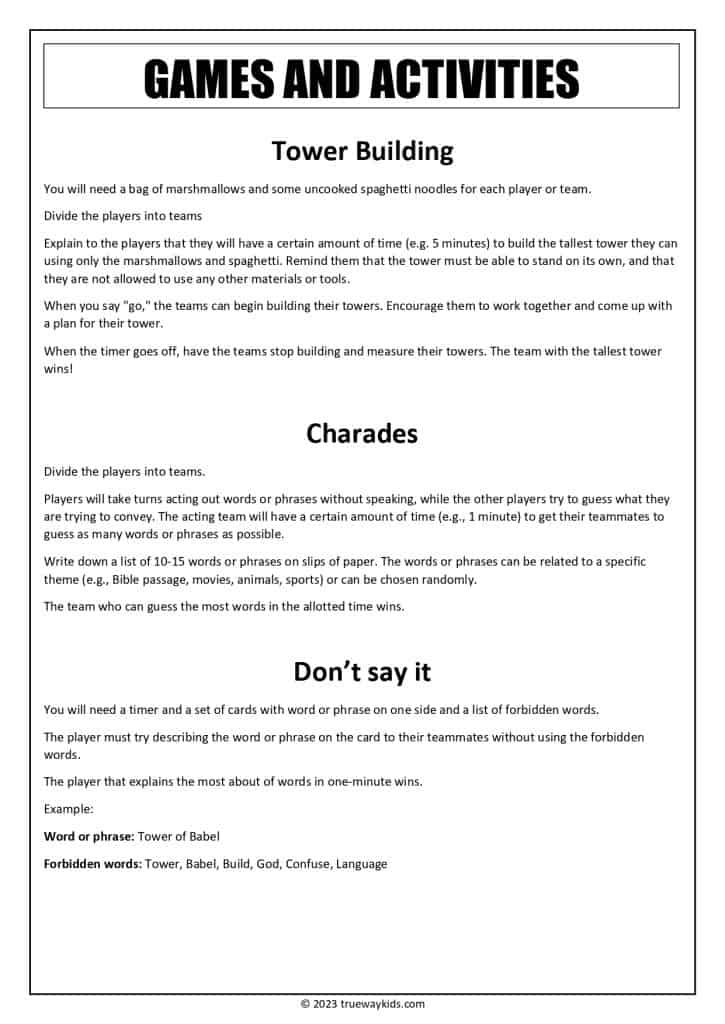
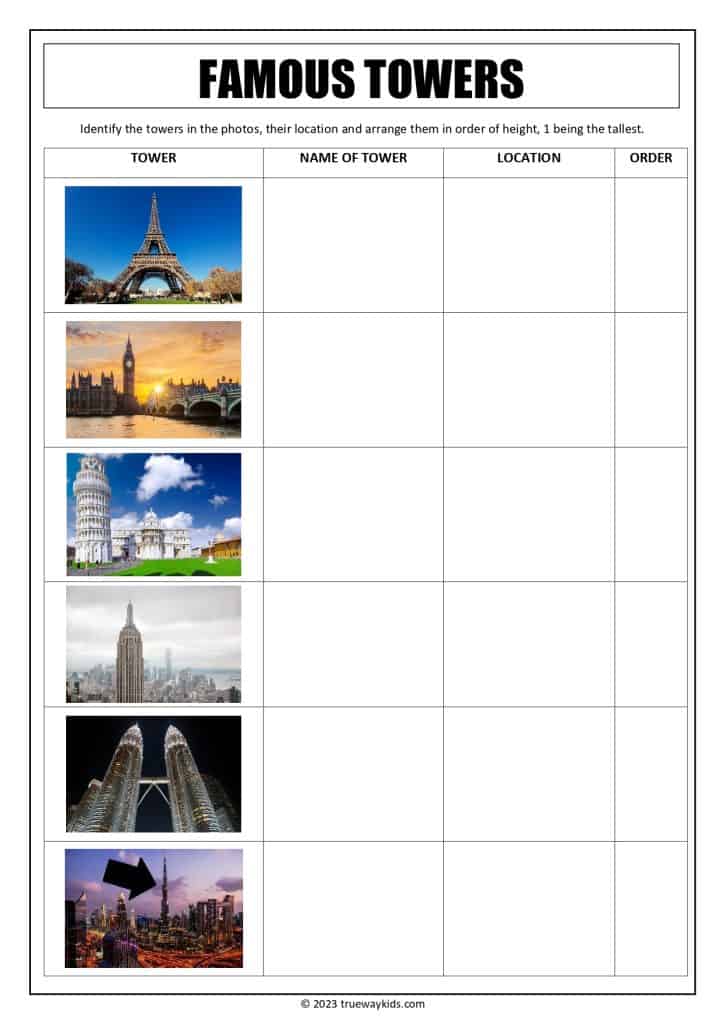

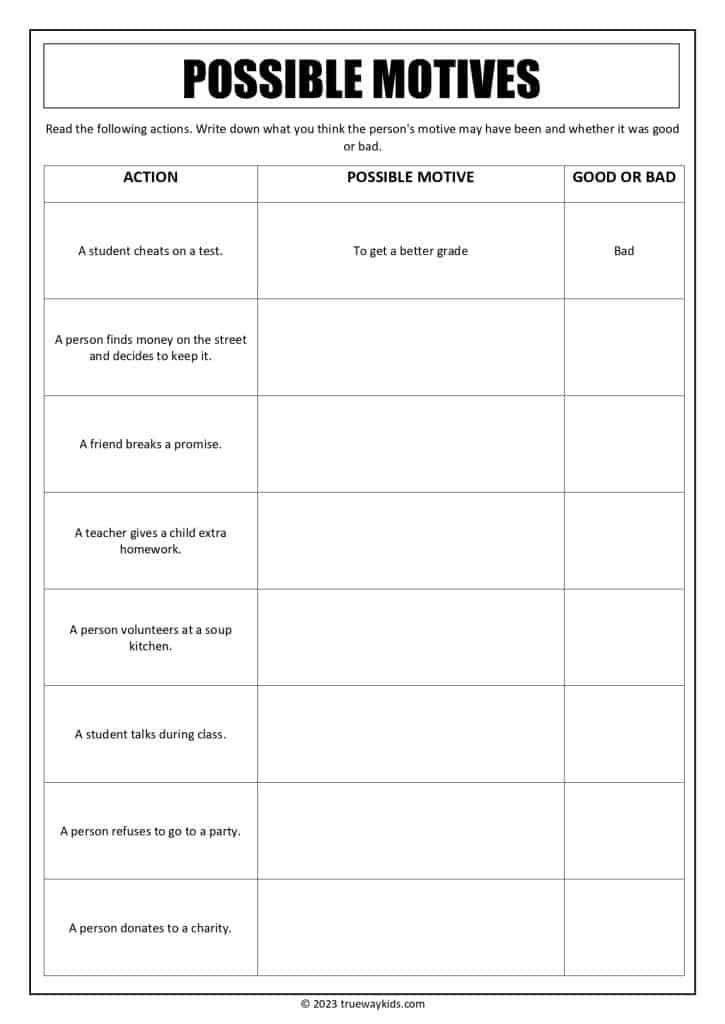
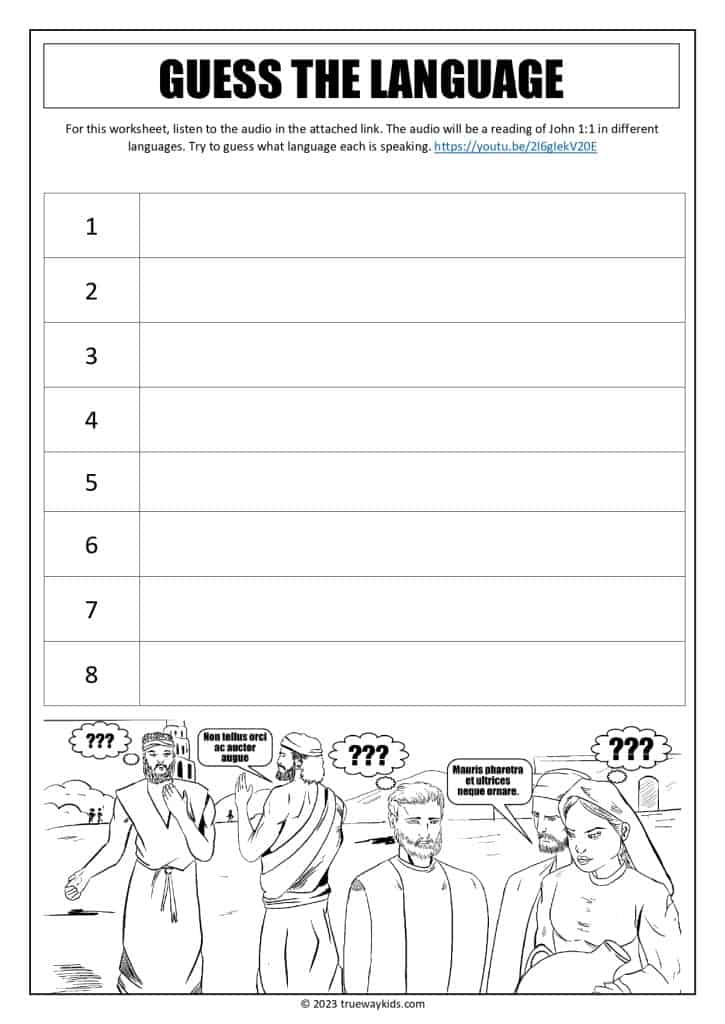
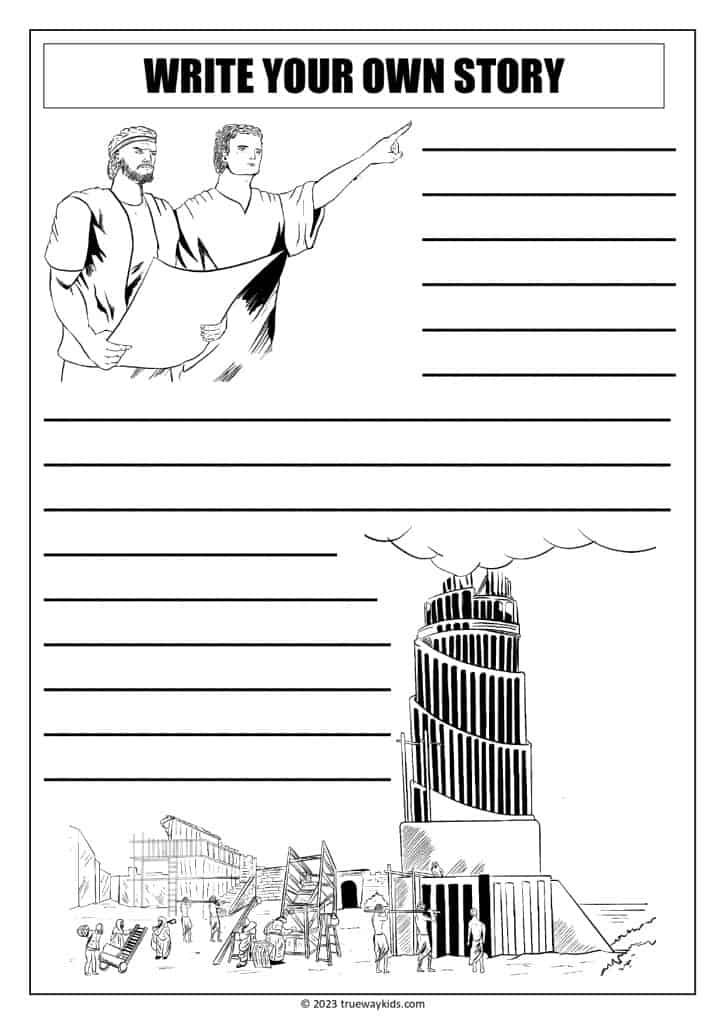

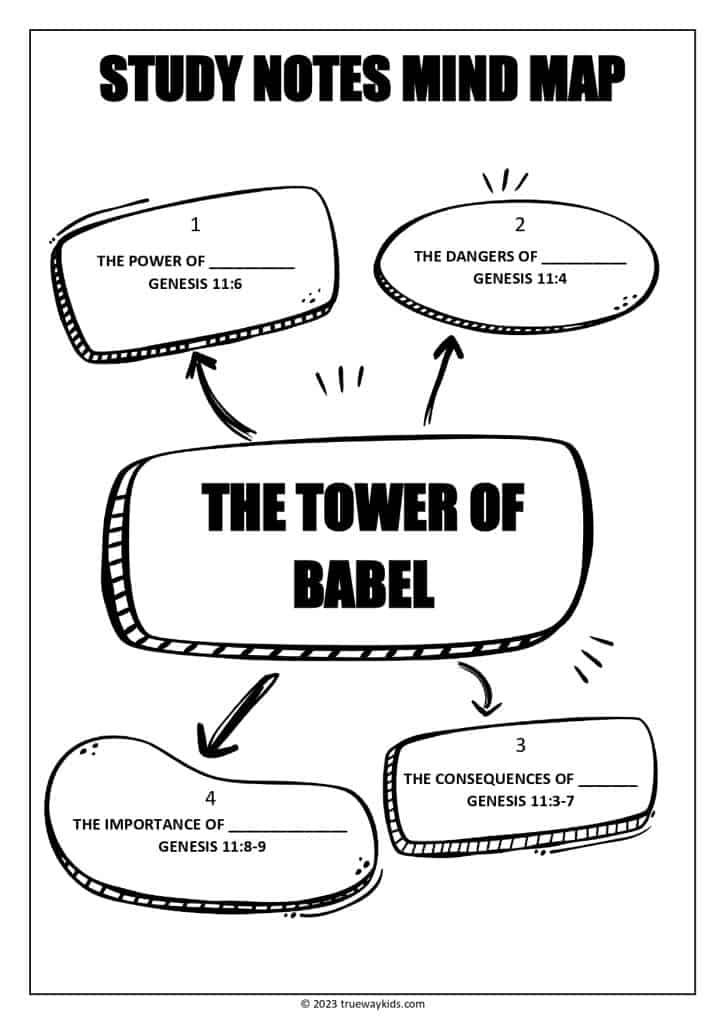
DOWNLOAD THE FREE PRINTABLE LESSON


